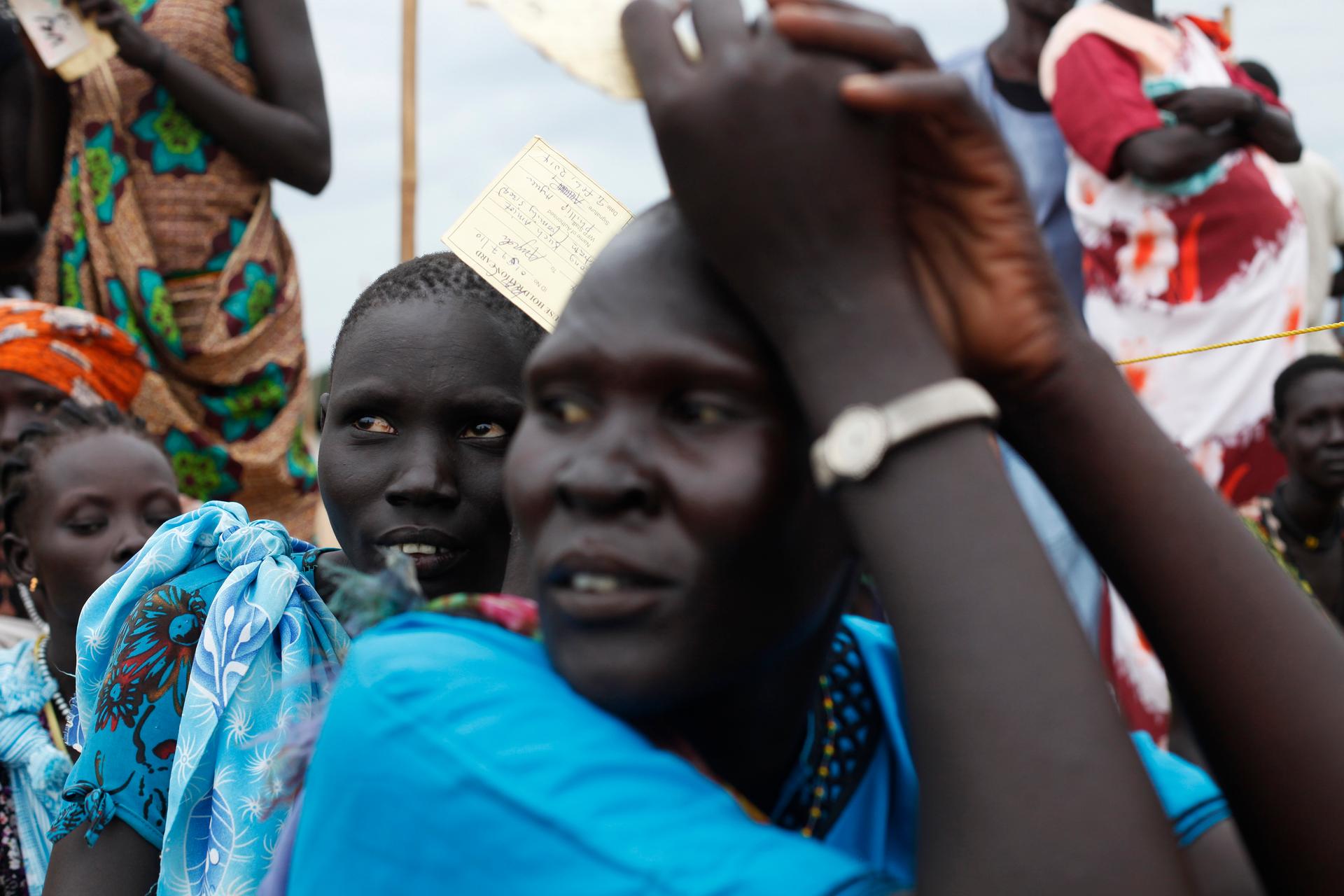The world’s youngest country turns three — but there’s not much to celebrate
Women hold their ration cards during food distribution in Minkaman, Lakes State, June 26, 2014. About 94,000 people have sought refuge in Minkaman after fighting broke out in neighboring states, according to the International Organization for Migration.
Three years ago this month, a new country was born in Africa. South Sudan was to be a beacon of hope for the South Sudanese people after decades of civil war with northern Sudan. It didn't turn out quite that way.
Since last December, South Sudan has edged toward collapse with a new civil war of its own. This week, aid agencies warned that the country could also face famine within weeks.
“The South Sudanese leaders have failed their people," says James Copnall, a BBC reporter who has writtten a new book about South Sudan called "A Poisonous Thorn in Our Hearts." He argues that South Sudan’s story is another example of the "liberation curse" faced by so many African countries: those best able to win freedom and peace are often those least equipped to govern it.
"Almost all of [South Sudan's leaders] are former rebel leaders, people more used to commanding troops than running a country," Copnall says. "In South Sudan, the liberation curse struck very ferociously."
That curse has taken the form of growing corruption, continued skirmishes with the north and tensions between former rebel factions. Conflict between South Sudan’s first president, Salva Keir, and former prime minister Riek Machar has turned violent. Both sides now lead armed forces against each other
Copnall was present for the original independence celebrations in 2011. “It was a really heady, emotional moment” he recalls. “[There were] old soldiers crying, people screaming; a moment of real joy. They’d fought against [Sudan’s capital] Khartoum for decades.”
But since then, he's seen the impact of South Sudan's decline on his friends in the country, some of whom have lost relatives in the fighting. Copnall remembers one man he interviewed who was typical of many young South Sudanese.
"David was initially so optimistic. He said, ‘We’ve got our country’," Copnall remembers. “The last time I saw him he was living in a refugee camp, having fled for his life after attacks on civilians by the military. He was in utter despair."
Three years ago this month, a new country was born in Africa. South Sudan was to be a beacon of hope for the South Sudanese people after decades of civil war with northern Sudan. It didn't turn out quite that way.
Since last December, South Sudan has edged toward collapse with a new civil war of its own. This week, aid agencies warned that the country could also face famine within weeks.
“The South Sudanese leaders have failed their people," says James Copnall, a BBC reporter who has writtten a new book about South Sudan called "A Poisonous Thorn in Our Hearts." He argues that South Sudan’s story is another example of the "liberation curse" faced by so many African countries: those best able to win freedom and peace are often those least equipped to govern it.
"Almost all of [South Sudan's leaders] are former rebel leaders, people more used to commanding troops than running a country," Copnall says. "In South Sudan, the liberation curse struck very ferociously."
That curse has taken the form of growing corruption, continued skirmishes with the north and tensions between former rebel factions. Conflict between South Sudan’s first president, Salva Keir, and former prime minister Riek Machar has turned violent. Both sides now lead armed forces against each other
Copnall was present for the original independence celebrations in 2011. “It was a really heady, emotional moment” he recalls. “[There were] old soldiers crying, people screaming; a moment of real joy. They’d fought against [Sudan’s capital] Khartoum for decades.”
But since then, he's seen the impact of South Sudan's decline on his friends in the country, some of whom have lost relatives in the fighting. Copnall remembers one man he interviewed who was typical of many young South Sudanese.
"David was initially so optimistic. He said, ‘We’ve got our country’," Copnall remembers. “The last time I saw him he was living in a refugee camp, having fled for his life after attacks on civilians by the military. He was in utter despair."
